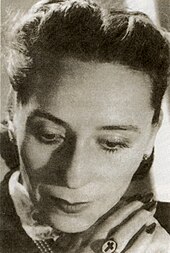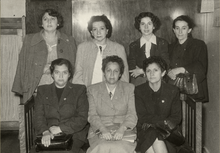Maria de la Cruz Toledo
María de la Cruz Toledo (born September 18, 1912 in Chimbarongo , Santiago de Chile , † September 1, 1995 ibid) was a Chilean political activist for women's suffrage , journalist , writer and political commentator. In 1953 she was the first woman to be elected to the Chilean National Congress.
Life
María de la Cruz Toledo was born in Chimbarongo, the daughter of Marco Aurelio de la Cruz and Edicia Toledo. She attended the Colegio Rosa de Santiago Concha and the Lyceum No. 5 in Santiago. Although she didn't graduate with a college degree, she was always considered a professional journalist. She began to write articles for magazines and brochures at an early age, she was the editor of a magazine for the blind and made political comments on a radio program called “María de la Cruz habla”.
Political activities
As a result of her political activities in the area of the women's movement , she founded the Partido Femenino de Chile in 1946 . This party existed until 1954. One of the party 's goals was to introduce women's suffrage in Chile. This goal was achieved in 1949. The party had about 27,000 members.
In 1948 De la Cruz ran unsuccessfully for the office of Senator from Chile with the support of Carlos Ibáñez del Campo . In the 1952 election, she led Ibáñez's campaign. After Ibáñez won the presidential election, he offered her to become Minister of Education in his cabinet. De la Cruz refused and instead suggested her party colleague María Teresa del Canto .
With the support of Ibáñez, the Partido Democrático de Chile (1952–1956), the Movimiento Nacional Independiente , the Organización de Mujeres Independientes , the Movimiento Nacional Ibañist and of course her own party, she won an overwhelming majority on January 4, 1953 as the first woman a seat in the Chilean Senate. She was sworn in on February 14, 1953 and took her place in the Senate.
However, her political career ended abruptly a short time later. Her self-confident demeanor earned her distrust and hostility. Eventually she was accused by three women of smuggling watches from Argentina . On August 4, 1953, she was charged and removed from her position despite a Congressional investigative committee voting against the measure. The affair was later cleared up, María de la Cruz Toledo was rehabilitated; there was little doubt that the allegations were brought up to politically harm and remove them from Congress.
The affair not only ended María de la Cruz Toledo's political career; the party that had founded it was also dissolved.
Years later, she took part in the presidential campaign of Jorge Alessandri , entered the Partido Nacional and took part in the Cacerolazo against Salvador Allende .
María de la Cruz Toledo died on September 1, 1995 in Santiago de Chile.
Individual evidence
- ↑ a b c d e f g Cruz Toledo, María de la | C | Icarito. In: icarito.cl. Retrieved November 9, 2015 .
- ^ Simon Collier, William F. Sater: A History of Chile, 1808-1994 . Cambridge University Press, 1996, ISBN 978-0-521-56827-2 ( books.google.com ).
- ↑ a b c Lidia Baltra Montaner: Señora presidenta--: mujeres que gobiernan países . Editorial Mare Nostrum, 2006, ISBN 978-956-8089-12-2 ( books.google.com ).
Web links
| personal data | |
|---|---|
| SURNAME | Cruz Toledo, Maria de la |
| BRIEF DESCRIPTION | Chilean politician, women's rights activist |
| DATE OF BIRTH | September 18, 1912 |
| PLACE OF BIRTH | Santiago de Chile |
| DATE OF DEATH | September 1, 1995 |
| Place of death | Santiago de Chile |

